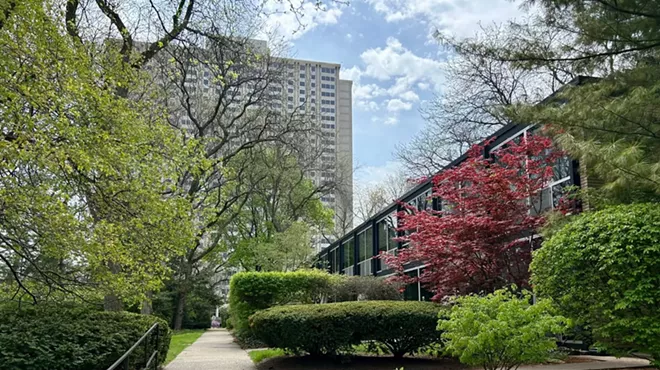The city of Detroit abruptly halted demolition this week on a controversial fast-food project after construction crews began tearing down a building next to a Montessori school without notifying nearby residents or businesses.
The building is being razed to make way for Detroit’s first stand-alone Chick-fil-A, a 3,000-square-foot drive-thru-only restaurant that developers say will serve up to 1,700 cars a day and generate $10 million in annual sales.
For families and small business owners in the East Side neighborhood, the project symbolizes something much bigger – the clash between wealthy developers and a corporate fast-food chain, and the people who live, work, and raise their children next door.
The project has faced resistance since the summer of 2023, and tensions boiled over Monday when parents and teachers at Giving Tree Montessori School, which shares a property line with the site and serves infants, toddlers, and kindergartners, arrived to find demolition underway without warning, fencing, or safety signage.
“There were no safety barriers, no signs, nothing,” Ben Earl, whose son attends the school, tells Metro Times. “There was heavy machinery operating right next to the playground where infants and toddlers were playing. It’s deeply troubling.”
Detroit’s Buildings, Safety Engineering, and Environmental Department (BSEED) acknowledged the misstep. Director Dave Bell tells Metro Times the contractor failed to notify neighbors before beginning demolition and that the city ordered work to stop until proper notifications are made.
“There is an approved demolition permit for this location,” Bell said. “We immediately halted the demo work until proper notifications are made.”
Bell added that there was no asbestos in the building and that the contractor has a required dust control plan in place. The city has since ordered the contractor to fully fence the perimeter before resuming work.
By Tuesday, a temporary fence had gone up, along with a sign reading “Chick-fil-A Coming Soon.” For parents, it was a short-lived victory that showed how little their concerns mattered.
“This was literally pushed on us,” says Joe Allemon, owner of Allemon’s Landscape Center, which sits directly next to the site. His family has owned the property since 1910. “They should have just given us a pacifier and forced it in our mouths and said, ‘Thank you for coming and telling us. You are pacified.’”
Allemon says he strongly objects to the restaurant being built so close to children.

“We’re not against the brand Chick-fil-A,” he said. “It’s the location that we’re really against. You couldn’t have picked a worse location. Why would you pollute the youth?”
Giving Tree Montessori School serves 116 children ranging in age from 12 weeks to kindergarten. Owner Renee Chown said the school’s outdoor playground, which backs up to the Chick-fil-A site, won’t be safe to use if the restaurant moves in.
“Basically this playground won’t be here for the babies and toddlers,” Chown tells Metro Times. “There’s no way I can expose these kids to what’s going to go on there — the exhaust fumes, the cigarette smoke, the swearing, and the rodents. This is no place for a Chick-fil-A.”
Opponents also argue the project violates a Detroit ordinance that prohibits fast-food restaurants from operating within 500 feet of a school. Giving Tree’s playground backs directly up to the Chick-fil-A site. For much of the process, the city maintained that Giving Tree didn’t meet the zoning code’s definition of a school, saying it functioned primarily as a daycare.
Initially, a spokesperson for BSEED told Metro Times that the restaurant was permitted to move forward because Giving Tree didn’t qualify as a “school” under city ordinance. But about two hours later, a different city spokesperson clarified that while Giving Tree is now a licensed school, it wasn’t officially recognized as one until June 2024 — two months after the city’s Board of Zoning Appeals approved the restaurant’s special land use in April.
Because the zoning approval came before the school’s licensing status changed, the city says the 500-foot restriction does not apply.
But critics say the city is splitting hairs to justify a decision that favors outside developers over longtime residents.
“It’s a school,” said Joe Allemon, whose family has operated a neighboring business since 1910. “The voice of reason is gone.”
The city was initially opposed to the project. In October 2023, after more than 30 people spoke out and 59 submitted written objections, BSEED denied Chick-fil-A’s original site plan, citing concerns about traffic flowing onto Marseilles Street, a quiet residential area.
But that denial was overturned in March 2024 by the Detroit Board of Zoning Appeals, which allowed the project to proceed under the condition that all traffic be routed through Mack Avenue. Critics say the city has failed to uphold that condition, and a revised site plan was quietly approved in April without public notice.
Even before demolition began, many say the approval process was riddled with secrecy and backdoor decisions.
“It’s moving through the process in a very peculiar way,” Earl says. “It’s not being done in a transparent manner.”
The restaurant is expected to open for breakfast and operate throughout the day, making it a potential traffic and noise nightmare for the school next door. When a Chick-fil-A opened in Shelby Township in 2021, traffic clogged roads for hours, and off-duty police had to be called in to direct cars.
“There are going to be tons and tons of cars,” Earl says. “And little kids are erratic — they run off. We’re going to have a line of idling vehicles right next to our school playground. That seems to have been glazed over in their reports. It was obfuscated at best.”

Chown and others have sent letters to city officials and attended public hearings, where speakers were limited to just a minute each. They say the city has rejected valid concerns in favor of an out-of-state corporation that will take money out of the community.
“They didn’t want anyone to know about it,” Chown insists. “Not only didn’t they notify us of the demolition, they didn’t even put up a fence. To me, they are nothing but corporate bullies. It’s a shame they want to do this to children.”
In February, Detroit City Councilwoman Latisha Johnson sent out a survey asking residents, along with school officials and parents, if they supported the project. She never produced the results of those surveys, residents say.
Despite the fence and signage now in place, opponents say they’re not giving up.
“Without a site plan approved, they shouldn’t be able to demo,” Earl says. “There’s a pretty substantial number of us fighting the good fight. This isn’t over.”
Neither Chick-fil-A nor Verus Development, which is handling the project, returned requests for comment from Metro Times.




